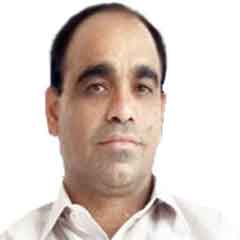According to weekly updates from Global Polio Eradication Initiative (GPEI) on June 26, 2019, five new wild poliovirus type 1 (WPV1) cases were reported from Pakistan and two from Afghanistan; bringing the overall number of cases in the two endemic countries in the first six months of 2019 to 32 and 10 respectively and 42 globally. These new cases indicate that polio outbreaks continue in these two countries.
New polio cases in Pakistan were confirmed during the three-day vaccination drive started on June 17. Pakistan, with 76 per cent of the global crippling virus, is said to be the most dangerous place for children worldwide. According to the WHO, as long as even a single child remains infected, children in all countries are at risk of contracting polio. Undoubtedly, this is an enormous challenge for the country.
The fact is many of the core areas are far-flung and high-risk regions, where, in the previous campaigns, numerous polio workers and security personnel had lost their lives while vaccinating children. It is spread through contact with the faeces of an infected person. It is also spread by drinking water or eating food that is contaminated with infected faeces.
On June, 17, the vaccination drive was launched in 45 districts of Pakistan. The National Emergency Operations Center set the target at vaccinating more than 12.25 million children in core areas, including 5.53 million in Sindh, 4.31 million in Punjab, 1.32 million in Balochistan and 1.1 million in Khyber Pakhtunkhwa.
The fact is many of the core areas are far-flung and high-risk regions, where, in the previous campaigns, numerous polio workers and security personnel had lost their lives while vaccinating children. Similarly, in this drive, thousands of frontline polio workers, especially women, risked their lives going door to door in their aim to protect children from a lifelong disability. This shows that the government of Pakistan is making integrated efforts for the eradication of the poliovirus.
Even educated parents are not willing to administer anti-polio vaccines to their children
Reportedly, of the overall 32 confirmed cases, 18 have been reported in Khyber Pakhtunkhwa, followed by eight in tribal districts, three in Punjab and three in Sindh. The primary challenge has been a lack of community acceptance due to cultural, social and religious norms. This has rendered some populations inaccessible to the polio vaccination programme. Prime Minister’s Focal Person on Polio Babar Bin Atta said nearly 10 per cent of the parents in three districts of Bannu, Lakki Marwat and North Waziristan, where tribal traditions are strong, have been refusing to vaccinate their children against poliovirus during vaccination campaigns. Indeed, amidst other factors, the parental refusal to vaccinate their children against poliovirus is largely responsible for the reported 32 cases in the country.
The problem of refusals is not new, but there is a great number of chronic cases involving parents refusing to have their children vaccinated against this crippling virus. The refusal is the outcome of the untruthful and playful propaganda initiated by some negative elements. However, vaccination carries no harmful side effects. On the contrary, the refusal itself is damaging for children. The tragic fact is that even educated parents are not willing to administer anti-polio vaccines to their children.
In 2014, the WHO declared Pakistan a polio-exporting country and had imposed travel bans on its citizens. The country was required to ensure that all its citizens and long-term visitors (of over four weeks) received a dose of oral polio vaccine (OPV) or inactivated poliovirus vaccine (IPV) between four weeks and 12 months before international travel; and that such travellers were provided with proofs of vaccination. Besides, polio-free states have taken precautionary measures to protect their citizens from polio. People who plan to travel to an area where polio is occurring should receive a booster dose of IPV. A single booster dose of IPV lasts a lifetime.
To attain the status of a polio-free state is of the essence for Pakistan. Viewing the international state of play, pressures and warnings for the purpose, the country should strive to hit the virus hard through concrete, fool-proof and productive initiatives. The change of mindset of people and stringent legal actions against those poisoning the minds of the people must strongly be necessitated to administer polio drops to vulnerable children. Besides, high-risk areas or sensitive regions, where both security concerns and parental refusals exist, should be painstakingly focused on.
As it is utmost important to vaccinate each child under five years in each anti-polio campaign, therefore, services of expert social mobilizers, especially women, broad-minded religious scholars, opinion-making political leaders, influencers and local dignitaries are to be availed essentially to win over hearts and minds. They should be charged with the task of enlightening the parents about the efficacy of vaccination and ramifications of the refusal of vaccination.
As it is utmost important to vaccinate each child under five years in each anti-polio campaign, therefore, services of expert social mobilizers, especially women, broad-minded religious scholars, opinion-making political leaders, influencers and local dignitaries are to be availed essentially to win over hearts and minds.
They should be charged with the task of enlightening the parents about the efficacy of vaccination and ramifications of the refusal of vaccination. They are needed to convince the parents that there is no cure for polio and vaccination is the most effective way to protect children from this crippling disease.
The writer is an academic
